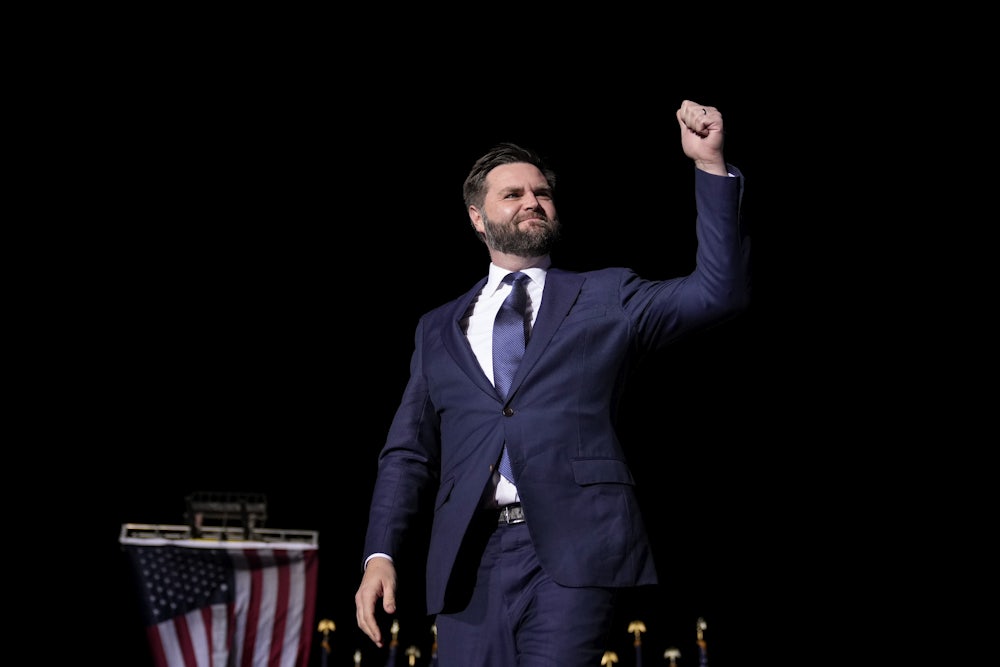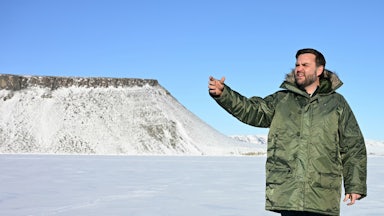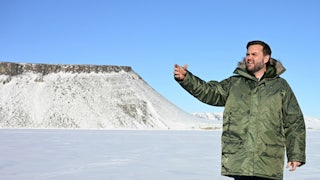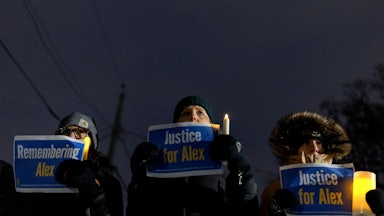Of many weird things that JD Vance said during the vice presidential debate, the weirdest came after Tim Walz revealed that his son had witnessed a shooting at a rec center.
“Christ, have mercy,” the newly Catholic Vance responded.
It was something that Catholic priests say during Mass, in their position as a proxy for Jesus. Everyone then repeats. Here was Vance, misappropriating a core element of Catholic ritual either to establish spiritual authority over Walz or to dodge the reality of his party’s acceptance of slayings—Trump’s running mate, you may recall, called such shootings a “fact of life” that is curiously only prevalent in the United States. Or perhaps he meant to do both.
“Peace be with you,” is what Catholics say to one another at Mass, a sentiment taken from Saint Francis of Assisi, who like Vance was a soldier—albeit one who actually fought (Vance was a Marine Corps journalist). Francis, after being brutalized as a prisoner, used the word peace as a radical rejection of the violence of battles fought for glory among medieval warlords, and also of the kind of indiscriminate slaughter Walz’s son witnessed. And yet these words, from Vance, would have been stranger still—not only because they were uttered at a debate, and not church, but because the kind of peace that Francis meant is something JD Vance doesn’t seem to value very highly.
Much has been said about the fact of Vance’s conversion to Catholicism, but less about its, well, weirdness—the way that he is, by his own account, drawn to the angry, dogmatic, and often violent stuff that the rest of us longtime and hereditary practicing Catholics had to learn to overlook, or flee outright: For every one convert, six people have left the Church of Rome.
JD Vance joined up on an August morning in 2019.
Here was a man of twists and turns who’d already changed his name five times. Born James Donald Bowman, he changed his middle name to David when his parents divorced, and later took the surname of a stepfather, becoming James Donald Hamel. When he enlisted in the Marines, he started going by J.D. Hamel, and in 2013 he changed his last name to Vance in honor of his grandmother. When he became a senator, he dropped the periods, going as JD. He ran through selves pretty fast, journeying from the Rust Belt to Yale Law by way of plundered Baghdad. This, however, was his greatest twist of all.
Here, in the presence of the unmoved mover, maker of heaven and earth, all that is seen and unseen, Vance was joining a faith whose finest poets include Gerard Manley Hopkins, who wrote, “The world is charged with the grandeur of God,” and the aforementioned Francis who assures us, still, that “all the darkness in the world cannot extinguish the light of a single candle.” These are words that didn’t come close to Vance’s mind that morning.
Instead he heard the voice of his grandmother echoing from his earliest years, way down beneath his pile of selves. What she said to him, as he seemingly fretted right down to the wire, was: “Better shit or get off the pot.”
All faith contains mystery, but this is something else.
In a 6,000-word essay titled “How I Joined the Resistance,” published in The Lamp in 2020, Vance offers conversion as a radical act, and describes the path that led him there.
He was raised on Protestant televangelists before joining the Marine Corps after 9/11. In his own words, he was “a young idealist committed to spreading democracy and liberalism to the backward nations of the world.” He returned “skeptical of the war” and embraced Hitchensian atheism, then found his way to the high altar of secular striving, Yale Law School, where he experienced a personal crisis, a psychic split between his past and his present: “I had immersed myself in the logic of the meritocracy and found it deeply unsatisfying. And I began to wonder: were all these worldly markers of success actually making me a better person? I had traded virtue for achievement and found the latter wanting.”
Enter Peter Thiel, who made his fortune in semi-illegal banking transactions (PayPal) and surveillance capitalism (Facebook) before turning (why not?) to Christian moralism. Thiel (“possibly the smartest person I’d ever met”) explains to young JD that his unhappiness is natural, because the Ivy League doesn’t really create people. According to Thiel’s self-adopted mentor, the French Catholic philosopher René Girard, it is all “mimetic rivalry,” status-driven emulation all the way down. In other words, Vance isn’t barren and broken; everyone else is.
Thus consoled, he begins reading City of God, published just after the sack of Rome in 410 C.E., by Aurelius Augustinus Hipponensis, a.k.a. Saint Augustine. “The words of Saint Augustine,” he writes, “echoed from a millennium and a half earlier articulating a truth I had felt for a long time but hadn’t spoken …”
It’s a laundry list of human suckiness:
This is our concern, that every man be able to increase his wealth so as to supply his daily prodigalities, and so that the powerful may subject the weak for their own purposes. Let the poor court the rich for a living, and that under their protection they may enjoy a sluggish tranquillity; and let the rich abuse the poor as their dependants.
Just when it might lead Vance toward compassion, the passage shifts to its real targets, people who seem like they’d be fun to know:
Let there be everywhere heard the rustling of dancers, the loud, immodest laughter of the theatre, let a succession of the most cruel and the most voluptuous pleasures maintain a perpetual excitement.
This will not be a class war but cultural conflict; sure as what ails Vance is cultural alienation, as he writes in his Lamp essay, “for an upwardly mobile poor kid from a rough family, atheism leads to an undeniable familial and cultural rupture. To be an atheist is to be no longer of the community that made you who you were.”
The man of many names knows pains so great that where a better mind would sense something fishy in Augustine’s shift from power to culture, he goes weak-kneed:
“It was,” he writes, “the best criticism of our modern age I’d ever read.”
Vance is on his way toward becoming Catholic under yet another new name, that of his chosen patron saint, Augustine. This is his saddest shape-shift yet because the passage that means so much to him—which he references in almost every interview about his new faith—is written in extreme bad faith, a slick con echoing across the millennia.
On an August morning in 410, Alaric the Visigoth sacked Rome, looting, raping, desecrating the tomb of Augustus, ending a world, and opening a psychic wound.
People blamed the empire’s new faith, Christianity. They did this for a number of reasons, including that Rome’s sackers were, well, Christians, freshly converted Teutonic barbarians who had only recently believed in giants and dragons. Knowing this, Augustine responds by … blaming the pagans entirely. It’s an early instance of Trumpian projection politics, which, hilariously, betrays Augustine’s own very imperial Romanness. He simply cannot part with the idea that God shows favor with earthly power, setting up a generally catastrophic project for his later followers on the Catholic right, to which Vance now belongs. In the twentieth century such horrors include the fascism of Franco’s Phalange and Salazar’s Estado Novo, whose greatest cultural output is Paula Rego’s paintings of women suffering from back-alley abortions, horrors bound to be happening, as you read this, in post-Roe America.
Add to this, now, the ghastliness of Vance himself, taunting refugees with hate speech vile beyond anything on Augustine’s vice list, slandering Haitian migrants as the eaters of their neighbors’ pets, and even, during the debate, blaming them for soaring housing prices. Look at these beasts, sacking the temple of the American home.
This, bizarrely, is what he’s come for: Catholicism as a worldly faith “that could speak against rising rates of divorce and addiction, not as sanitized conclusions about their negative social externalities”—or as we might call it, compassion—“but with moral outrage.”
Why? He finds it grounding, a trip back to his Appalachian roots: “It was my Mamaw’s Christianity,” he writes. “And the name it gave for the behaviors I had seen destroy lives and communities was ‘sin.’” He thinks he’s found a way to change while staying the same, forgetting the words of the Red Queen to Alice in Wonderland: “In my kingdom you have to run as fast as you can just to stay in the same place.”
Spirit, too, can be exhausted, and it’s hard to imagine anything more spiritually draining than standing on national TV and pretending that a junior demon gorging on cheeseburgers down in Palm Beach won the 2020 election.
Such a thing hollows out the soul.
The German philologist Walter Otto was an expert on Jesus’s forerunner and fellow wine enthusiast Dionysus. He believed Dionysus was, more or less, real. He said it was the height of intellectual myopia to deny the fact of encounters between the human and the divine in all ages. Religion, he said, is the set of rituals marking those encounters, but as the vibrancy and memory of wild contact fades, a religion can dry out, becoming just an empty fossil, undesirable for most but alluring, I think, for an empty man.
Perhaps Vance might, in his next crisis of self, find fresh beginning in the lines of Gerard Manley Hopkins—words far less angry and more wondrous (such is grace) than misread Augustine:
And for all this, nature is never spent;
There lives the dearest freshness deep down things;
And though the last lights off the black West went
Oh, morning, at the brown brink eastward, springs—
Until then, Christ have mercy.










